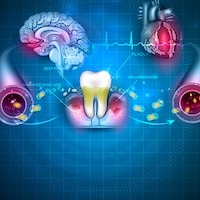More News About Oral Health Linked to Brain Health
August 22nd, 2023
Participants included 172 individuals with an average age of 67 who had not exhibited any memory issues at the start of the four-year study. The participants also received brain scans at the start of the study and at the end to measure volume of the hippocampus, the part of the brain that plays a major role in our memory and learning.
As summarized by the American Academy of Neurology, the world’s largest association of neurologists and neuroscience professionals, the results showed a faster rate of brain shrinkage in individuals with gum disease and tooth loss. They linked the number of teeth and severity of gum disease to changes in the left hippocampus of the brain.
From the organization: “After adjusting for age, researchers found that for people with mild gum disease, the increase in the rate of brain shrinkage due to one less tooth was equivalent to nearly one year of brain aging. Conversely, for people with severe gum disease, the increase in brain shrinkage due to one more tooth was equivalent to 1.3 years of brain aging.”
Gum disease has been associated with a growing list of serious health issues like diabetes, heart disease and stroke. While we still don’t have the definitive link, it seems evident that early detection can mean the difference between a beautiful smile with a healthy set of teeth, or tooth loss and a potentially adverse effect on chronic health conditions and risk of other disease.
Don’t delay treatment if you’ve been diagnosed with gum disease. In its earliest stages, gum disease is reversible with proper professional treatment and improved at-home care.
Call our office and make an appointment for a consultation if you have any questions. We’re here to help!
